Proper nutrition for weight loss begins to interest us as soon as we realize that diets do not help. Diets don't help - that's a fact. Why? The answer lies in the prohibitions and restrictions that abound in both modern and well-known, "proven over the years" diets. The right diet for weight loss, strange as it may sound, should be varied, healthy and nutritious. There are several basic principles of such a diet. There are also a bunch of misconceptions, misjudgments, stories about fantastic super foods, blacklists of "harmful foods" and stories about their miraculous rehabilitation.

Before we start talking about nutrition, you need to understand that in recent years, to be more precise, over the last 25-30 years, the balance of essential nutrients - proteins, fats and carbohydrates - has become very crooked against the carbohydrate component. At the same time, there is no need to strain and calculate too much - go to any store and look out the windows with sweets. They occupy about a quarter of the store! The first step to switching to a diet suitable for weight loss will be to completely give up sugar in your daily diet. Sounds scary, doesn't it? Do you know why? Because sugar addiction is like drug addiction.
- Well, it started. . . - Someone will say in frustration, - Again, bans and restrictions!
After a few minutes of attention, you will agree that giving up sugar can be a huge improvement in improving the health of the body and, consequently, weight loss.
Of course, we need carbohydrates. Which one? We've all heard of fast and slow carbs. We need the slow ones. Cereals, wholemeal flour, vegetable dishes. . . Fruits and berries are full of fast carbs, but it's better to eat fruits and berries than to buy sweets in the confectionery department. Many nutritionists recommend a decisive and drastic abstinence from carbohydrates and all kinds, and reduce their consumption to 20-50 g per day. Such a drastic shift from habit to good can lead to dizziness, loss of energy, bad mood, and the belief that it is not so good and that it is proper nutrition.
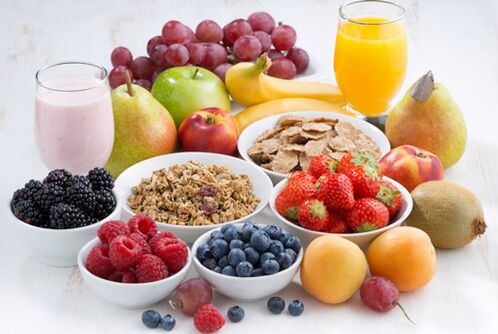
Proper nutrition for weight loss will bring more benefits and joy if you do not make mistakes, gradually, consistently. But first you need to understand why our body stubbornly resists any change, especially the reduction of sugar.
Sugar is really the scourge of our time. Even a teaspoon of sugar is not enough in the few products offered to us in supermarkets. We don't even talk about sweets now! Juices, yogurts, marinades, sauces, semi-finished meat products, sausages and sausages, canned fish, ready-made soups, ready-made noodles. . . The list is almost endless! As terrible as the transition to the new principles of nutrition is, we have almost no food! Don't panic, there is a way out and it is quite peaceful.
Proper nutrition for weight loss starts with three steps.
The first step:Remove the sugar in its pure form. Tea, coffee, sugar-free compotes. We give up the joy of canning, jam, sweets, chocolate, cookies and other teas with our friends or during work breaks. Ice cream, cakes, low-calorie marshmallows have been removed from our table! All carbonated beverages are prohibited. Try to go two weeks, just two weeks without sugar - you will be surprised. Tea has a different taste. Coffee too. Cocoa is milky, but sugar-free, better than any stimulant. What to give with tea? At this stage, nuts (unsalted), dried fruits, energy mixes with honey (a mixture of nuts and dried fruits, go through a meat grinder, you can add lemon), sandwiches with butter (yes, yes! ), Cheese and normal sausageand better with home-cooked pork, caviar, lightly salted salmon, and so on. At the same time, all these pleasant things should be included in tea, breakfast, lunch or dinner and should not be a habitual snack. However, after a bit about snacks.
The second step:As the body slowly shifts to carbohydrates, it's time to eliminate foods with a high glycemic index: first-class wheat flour, white rice and potatoes. That is, all breads, loaves, cakes, porridge, semolina porridge made from peeled rice, as well as everyone's favorite semolina cakes and all kinds of potatoes are automatically converted into a pleasure from everyday meals. Yes, soups will be without potatoes. At the same time, rye bread and bakery products made from wholemeal flour (without sugar, remember? ), Buckwheat is steamed or washed overnight with clean water, ready oatmeal is mixed very well with fermented dairy products and all exotic or written, like quinoaforgotten cereals. In addition, it is necessary to openly exclude sweet fruits from the diet - bananas, grapes, pears. The berries are not included in this list due to their high acidity.
The third step:At this stage, you should give up any carbohydrates, leaving only the natural carbohydrates contained in vegetables and sour berries. However, sometimes the first two steps are enough to significantly reduce weight. If you fulfill a few more conditions in parallel, you will not have to look for a new diet for yourself - you will go to a whole new level for life, where proper nutrition comes first.
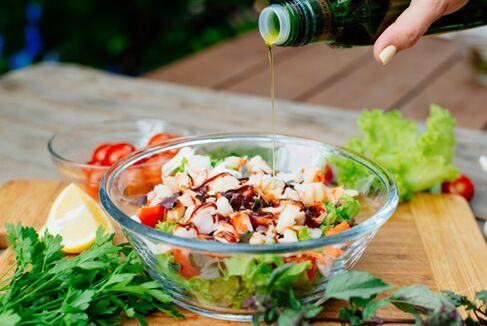
A suitable diet for weight loss should be varied.This means that the balance includes not only the popular BJU (proteins, fats and carbohydrates), but also vitamins and trace elements. If carbohydrates bring us energy in a clean, accessible form, it is more difficult for the body to get this energy from proteins and more fat. But as is often the case, getting what is difficult is generally the most beneficial. Calories from carbohydrates are generally excessive, our body makes almost no effort to process them, so the "sugar calories" fit so quickly into comfortable fat rolls.
Protein is important for our body.Protein is important throughout life: it is a building material in childhood, an element that helps our body to work as long as possible and keep itself in good condition in adulthood. Judge for yourself: protein performs a protective function, promotes the production and transport of antibodies, the most popular protein hemoglobin provides oxygen to every cell, a regulator - without protein it is impossible to produce normal hormones, motor - all kinds of movement are provided. proteins myosin and actin, plastic - collagen protein from the condition of connective tissue, the appearance of the skin, etc. Responsible, energy - proteins provide energy to the body. However, perhaps one of the most important functions of a protein is the protection and transmission of gene information. Alzheimer's disease, an increasingly common and terrible disease, is believed to be directly linked to a lack of protein intake (not just with it, but a little lower than the second most important component).
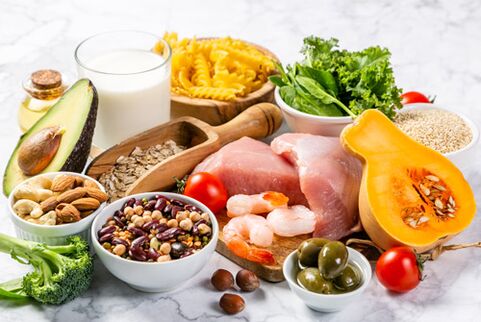
How much protein does a middle-aged person need? Many nutritionists, doctors, and proponents of proper nutrition adhere to the protein intake standards developed by the German scientist Max Rubner more than a hundred years ago, and this norm was 0. 33 g of protein per kilogram of human weight. Much has changed since then, science has advanced, and recent studies have drawn an average of 1, 2 - 2, 0 g per 1 kg of body weight. An impressive difference. Moreover, this is not the weight of 1, 2 - 2, 0 g of product, let's say a piece of meat or a part of beans, but pure protein in the product. A sample table of high protein foods is available on our website. Our site has written more than once about the benefits of protein products, but it never hurts to repeat these general truths.
Despite the great popularity of vegan, raw foods and vegetarian diets, we need at least 50% animal protein to keep our bodies alive and well. These are eggs, dairy products, fish and seafood, meat and offal. Unlike plant foods, these proteins have a complete set of amino acids. Although they are edible, only diversity is the essence of proper nutrition!
It is clear that there are few products on our planet that contain any substance. Almost every food is a combination of protein, carbohydrates and fats. And the fats that are the last ingredient here are perhaps the biggest crime in the history of nutrition science. In a "perfect" moment, fats were declared the enemy of health. Everyone has heard horror stories about cholesterol, blood vessel plaques, and other horrors. As you look at how stores fill an assortment of low-fat or completely low-fat products at an enviable rate, you begin to doubt your sincere desire to give us "proper, " "healthy, " "live" food, because there is nothing. It is correct and useful in the absence of fat in the diet.
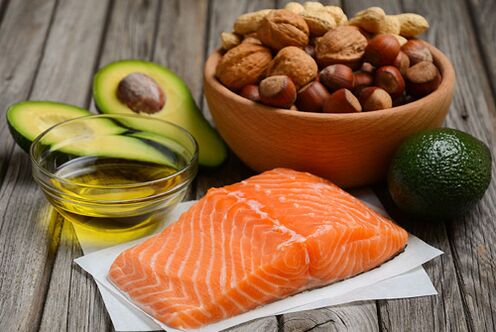
What is the function of fats in our body? You will say - help in the assimilation of fat-soluble vitamins. Is that all? Biology from school daysSomeone in the class will remember the heat exchange function of oils. Thus, the most important function of fats in the body is the metabolism of milk, that is, in simple terms, the exchange of oxygen in the alveoli of the lungs. The fat covers the walls of the alveoli with the thinnest layer and allows us to breathe and. . . allows us to live. My grandmother's methods of treating lung diseases are immediately remembered: badger oil, dog oil, goose fat, hot milk and butter - there is fat everywhere inside and out, and it helped! By the way, it still helps, just drugs to treat hypoxia (oxygen starvation), now sold for wild money, are actually fat emulsions. Another important function of fats is the synthesis of membranes. The cell membrane is composed of 70-85% fat, and the function of the membrane is to provide cell protection, thermal insulation, and selective conductivity (because not everything that tries to enter the cell is useful or necessary for it). The layer of myelin, this insulating coating of our nerves, is 70-80% saturated fat. No myelin - get Alzheimer's disease, old (quite young) sclerosis and dementia. Fat is one of the vital substances that builds membranes, myelin sheath, their function and the functioning of the central and peripheral nervous system. Keep this in mind when choosing skim milk between 0, 5 and 3, 2%.
Another important function of fats is hormonal. These are the sources of fats for the synthesis of hormones, and there are many of them in our body. These include growth hormones, protein hormones, thyroid hormones, digestive system hormones, steroid hormones, adrenal hormones, sex hormones, and so on. Clearly, the slightest bias or low production of any hormone threatens major disruptions in the functioning of the whole organism. Sudden onset of blackheads and acne, all kinds of skin rashes, is a sign of low androgen levels. Frequent headaches "for no reason" may be a sign that estrogen levels are low. Constant insomnia - not enough progesterone. Fatigue, exhaustion and even fatigue at rest can also be a sign of impaired production of thyroid hormones. Hair loss is also a sign of this disorder. Weight gain may be due to high levels of estrogen, cortisol and insulin, along with low testosterone levels. Forgetfulness and distraction are indicators of low estrogen and cortisol levels. How everything is connected!
Oils are responsible for heat regulation. For this reason, men who are not on a diet are often hotter than women who lose weight. Frequent freezing of your hands and feet is probably a sign of fat deficiency, if not a kind of congenital feature. The most popular function of fats is to help melt and absorb fat-soluble vitamins: A, E, D, K. Sitting on a fat-free diet and drinking vitamin complexes is not an option, vitamins simply will not be absorbed.
And finally, last but not least - vitamins, minerals, macro and micronutrients. These substances are present in different amounts and combinations in all products, but special attention should be paid to fresh vegetables, roots, fruits and berries. One of the most valuable vitamins - vitamin C is not synthesized in our body and can be obtained only from fresh plant products. Our site has filled a whole section about vitamins, read, useful! Plant foods contain enzymes and flavonoids, all kinds of minerals, without which we can not function normally. For example, potassium - without it, the heart will not work. Magnesium is responsible for the health of the brain, nervous and hormonal systems and is involved in metabolic processes. Both plant products contain fiber - without it, digestive and peristaltic processes are almost impossible!
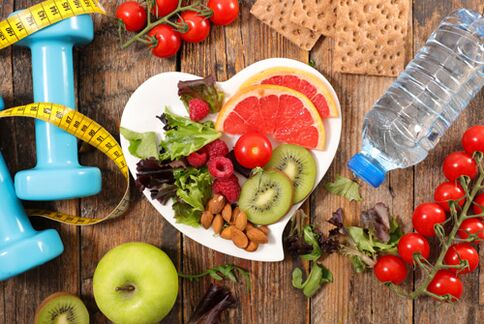
Proper nutrition to lose weight and improve the body includes the following principles:
Do not eat more than three times a day. Unexpected, huh? What about 5-6 meals a day advertised in many recommendations? Such fractional meals are perfect for children, athletes and the seriously ill. If you are not in any of these categories, eat three or even twice a day.
Eat only at night, not when you feel hungry. Breakfast is optional! If you do not want to eat breakfast, change breakfast a few hours later. Don't force yourself to eat just because someone says breakfast is the most important thing.
Learn to listen to yourself and understand the difference between the habit of mixing hunger with something ordinary. The following advice will help with this.
Drink water. Sometimes not in liters as recommended. Uncooked. Ideally bottled or summer. It is very simple to disgrace the drinking regime: 2 glasses of warm (not cold and not hot water) in the morning, 1-2 glasses in the afternoon and 1. In the evening 1. Sometimes it is enough to drink water to understand that you are not hungry, just thirsty.
Get in the habit of buying all kinds of nuts and seeds more often. In addition to fats, they contain large amounts of macro and micronutrients.
Eat all foods. That is not fat-free! Curd - 9% fat, not less, with sour cream, creamy coffee, butter sandwiches, fat cheeses, oily sea fish, exotic avocado, bacon! This is not a typical "fire to fire" bend. Of course, everything needs a measure.
Don't forget the proteins! But it is important to combine what is less important. And this recommendation will be the last.
Eat vegetables. Lots of vegetables and greens. Fresh, salted, pickled, steamed, boiled and even fried in oil! But fresh salads are definitely an advantage. It is not difficult to calculate the amount of vegetables: mentally divide your plate into two parts - half will be occupied by vegetables, the other will correspond to proteins, fats and the same minimum allowable carbohydrates.
Proper nutrition for weight loss is not a serious tables and recipes. This is a deliberate approach. All of these recommendations will only work if you are almost completely giving up carbs. If you combine proteins with carbohydrates (mashed potatoes with cutlets) or fats with carbohydrates (bacon), you're done. Or rather, no, of course, you will not die immediately. You will suffer with every new kilogram and complain about injustice ("I literally sit on the same water, where does the fat come from? "). There is no need to sit on the water, suffer from hunger and dietary products. Start with just three steps and walk to health and beauty without going anywhere.














































































